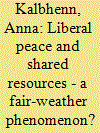|
|
|
Sort Order |
|
|
|
Items / Page
|
|
|
|
|
|
|
| Srl | Item |
| 1 |
ID:
110809


|
|
|
|
|
| Publication |
2012.
|
| Summary/Abstract |
Despite many claims by high-ranking policymakers and some scientists that climate change breeds violent conflict, the existing empirical literature has so far not been able to identify a systematic, causal relationship of this kind. This may either reflect de facto absence of such a relationship, or it may be the consequence of theoretical and methodological limitations of existing work. In this article we revisit the climate-conflict hypothesis along two lines. First, we concentrate on indirect effects of climatic conditions on conflict, whereas most of the existing literature focuses on direct effects. Specifically, we examine the causal pathway linking climatic conditions to economic growth and to armed conflict, and argue that the growth-conflict part of this pathway is contingent on the political system. Second, we employ a measure of climatic variability that has advantages over those used in the existing literature because it can presumably take into account the adaptation of production to persistent climatic changes. For the empirical analysis we use a global dataset for 1980-2004 and design the testing strategy tightly in line with our theory. Our empirical analysis does not produce evidence for the claim that climate variability affects economic growth. However, we find some, albeit weak, support for the hypothesis that non-democratic countries are more likely to experience civil conflict when economic conditions deteriorate.
|
|
|
|
|
|
|
|
|
|
|
|
|
|
|
|
| 2 |
ID:
109192


|
|
|
|
|
| Publication |
2011.
|
| Summary/Abstract |
The aim of this article is to empirically analyse liberal peace arguments in the context of shared river basins. In particular, it argues that counter to the water war hypothesis, sharing a river need not necessary lead to conflict over the shared resource: relying on liberal arguments, joint democracy is expected to facilitate trust and thus cooperation over transboundary rivers. Furthermore, by mitigating asymmetries, facilitating (implicit) side-payments and issue linkage, both economic and political interlinkages may encourage cooperation over shared rivers. Previous work suggests that these factors might be a 'fair-weather' phenomenon, that is, that they play a role only for problems that are easy to solve. In this article, liberal effects are allowed to vary with the difficulty of the underlying problem by separating different issues and geographic situations. Empirically, the article focuses on intergovernmental behaviour using a new dataset on transboundary water events covering all international basins for a period of eleven years (1997-2007). The results show that indeed liberal peace factors matter with respect to intergovernmental interaction over shared river basins and the effect of joint democracy is more prominent under 'fair-weather' conditions.
|
|
|
|
|
|
|
|
|
|
|
|
|
|
|
|
|
|
|
|
|